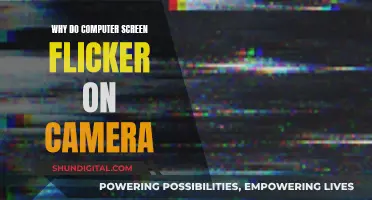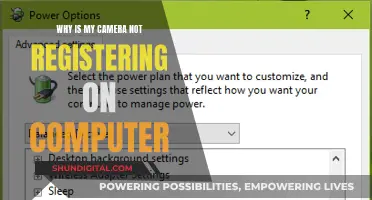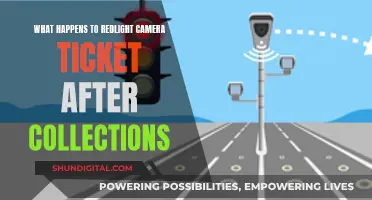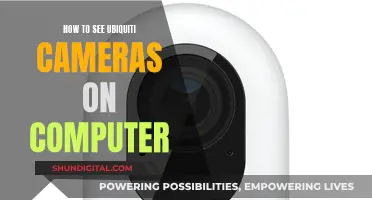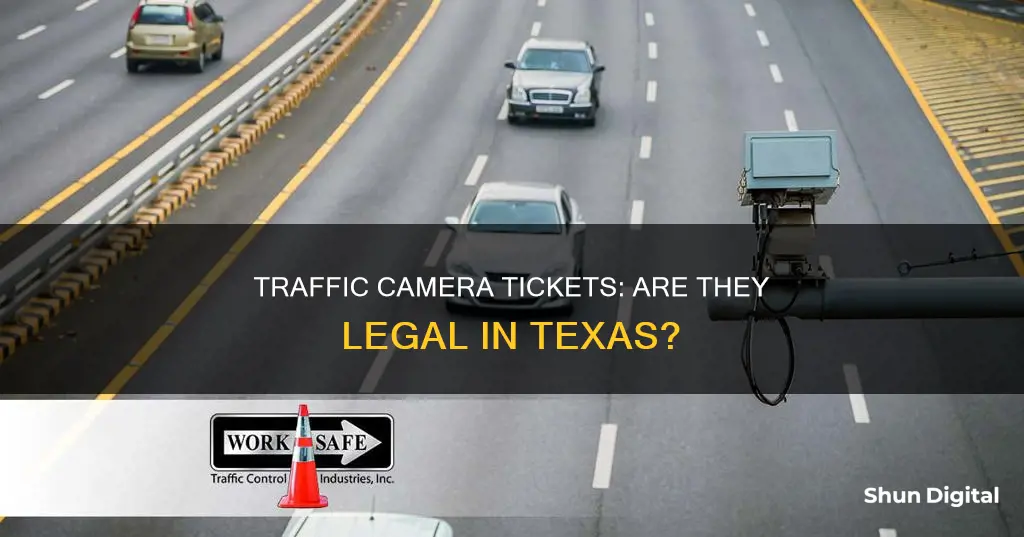
Texas has been a hotbed of debate over the legality of camera traffic tickets, with residents expressing mixed feelings about the installation of these devices. In 2019, the state legislature banned the use of photographic traffic enforcement systems, but the story doesn't end there. Some cities continued to operate traffic cameras, leaving drivers confused about their obligations. While a police officer observing a violation firsthand can issue a ticket, reviewing camera footage doesn't grant them the same authority. This grey area has led to discussions about privacy invasion, the effectiveness of the cameras in reducing crashes, and the revenue generated from fines.
| Characteristics | Values |
|---|---|
| Year of ban on red light cameras | 2019 |
| Texas Transportation Code | Chapter 707 |
| Municipalities with exceptions to the ban | Balcones Heights, Humble, Leon Valley, and Amarillo |
| Tickets received from remaining cameras | Not enforceable |
| Non-payment of tickets | May affect credit score or vehicle registration |
What You'll Learn

Texas banned red-light cameras in 2019
The ban on red-light cameras in Texas was driven by several factors. One of the main concerns was the violation of drivers' constitutional rights. Opponents of the cameras argued that they infringed on the principle of innocent until proven guilty, as the cameras often captured clear images of license plates but not the drivers themselves. There were also questions about the constitutionality of using law enforcement officers, who review the camera footage, as witnesses against the accused drivers.
Additionally, the effectiveness of red-light cameras in improving public safety was debated. While some studies showed a reduction in T-bone or angle accidents at intersections, others found a significant increase in rear-end collisions due to sudden braking. A Case Western Reserve University study, cited in Governor Abbott's report, revealed a 28% increase in non-angle accidents in Houston and Dallas due to the presence of red-light cameras.
The cost of installing and operating the cameras was also a factor in the decision to ban them. According to the report, each camera installation cost $100,000, and many drivers chose not to pay their tickets, as they had no impact on their driving records and did not result in any legal consequences.
It is important to note that the ban on red-light cameras in Texas did not immediately remove all such cameras from the state. Some cities with existing contracts were allowed to continue operating the cameras until their contracts expired. However, the law prohibited local authorities from issuing citations or seeking civil or criminal penalties based on recorded traffic signal enforcement photos.
Focusing Camera on a Mesh in Blender: Easy Steps
You may want to see also

Some cities can still use cameras until their contracts expire
In 2019, Texas banned the use of red-light cameras, also known as photographic traffic signals. This legislation, House Bill 1631, prohibits local governments from issuing citations or complaints and seeking civil or criminal penalties based on images from traffic camera systems.
However, the law does allow cities that contracted with third-party operators to continue using the cameras until their contracts expire. This provision in the law means that certain cities can continue to operate the cameras and issue tickets, but they cannot enforce the fines. Cities that currently use this equipment include Balcones Heights, Humble, Leon Valley, and Amarillo.
The Texas Transportation Code, Chapter 707, states that a "local authority may not issue a civil or criminal charge or citation for an offense or violation based on a recorded image produced by a photographic traffic signal enforcement system." This code effectively bans the use of red-light cameras as a means of enforcing traffic laws in Texas.
Despite the ban, some cities in Texas continue to have traffic cameras in place due to the provision that allows them to fulfil their contractual obligations. This has created a grey area, as while these cities can still issue tickets, they cannot enforce the associated fines.
It is important to note that while most cities in Texas have stopped using red-light cameras, drivers may still receive tickets from the remaining cameras in some jurisdictions. Consulting with a lawyer or legal professional is advisable in such cases, as there may be technicalities and legal ambiguities surrounding the ban.
School Bus Camera Tickets: Where to Pay in Gwinnett County
You may want to see also

Tickets from red-light cameras don't need to be paid
In 2019, Texas banned the use of red-light cameras, or photographic traffic enforcement systems, through House Bill 1631. This means that tickets from red-light cameras do not need to be paid.
According to Texas Transportation Code 707.021, "A local authority may not issue a civil or criminal charge or citation for an offense or violation based on a recorded image produced by a photographic traffic signal enforcement system." This means that tickets from red-light cameras are not valid and do not need to be paid. However, it's important to note that this only applies to tickets issued by a camera and not by a police officer reviewing footage.
The ban on red-light cameras in Texas is due to privacy concerns and the invasion of privacy that many drivers in the state felt these cameras represented. The controversy surrounding these tickets also stems from the fact that many see them as a way for cities and municipalities to generate revenue from traffic violations.
Despite the ban, some cities in Texas, including Humble, Amarillo, Leon Valley, and Balcones Heights, have continued to operate red-light cameras due to a provision in the law that allows them to fulfil existing contracts with vendors. While you may still receive a ticket from these cameras, the issuing cities cannot enforce any fines.
If you receive a red-light camera ticket in Texas, it is considered a civil violation, similar to a parking ticket. By law, these tickets cannot be reported on your driving record, and an arrest warrant cannot be issued. Additionally, unpaid fines cannot be reported to a credit bureau and will not affect your credit score. However, it's important to note that the county you received the ticket in may still decide to block your vehicle registration, preventing you from renewing it.
Airline-Approved: Small Cameras with Lithium Batteries
You may want to see also

Unpaid fines may be sent to a collection agency
In Texas, unpaid traffic fines may be sent to a collection agency. If you have never been to court but pay what the collection agency tells you to pay, you will be considered to have entered a plea of "no contest" and give up your right to trial. If you pay the ticket through the collection agency, the agency can charge you an additional 30% of the total amount owed as a fee. That means if you owe $100, the collection agency can charge you an additional $30 for a total of $130.
Even if you are receiving notices or calls from a collection agency, you still have the same rights. You can choose to deal directly with the court and seek an alternative sentence, bypassing the collection agency. You have the right to plead not guilty and have your guilt or innocence determined at a trial, if you have not already entered a plea.
Even if you have already entered a plea of not guilty or no contest or been convicted at trial, you have a right to a hearing before the judge to consider whether you cannot pay what you owe. You still have the right to an alternative sentence, like a payment plan or community service, if the judge determines you cannot pay.
In short, you do not have to pay the collection agency and can instead contact the court directly and ask to set up a hearing if you wish to do so.
It is important to note that failure to pay traffic fines or appear in court can result in additional consequences, such as a warrant being issued for your arrest, denial of driver's license renewal, or suspension of vehicle registration under the Scofflaw Program.
The Evolution of Fujifilm Cameras: A Manufacturing Journey
You may want to see also

Red-light cameras improve road safety
In Texas, the use of red-light cameras, also known as photographic traffic signals, has been prohibited since 2019. This is because many Texas residents considered the cameras to be an invasion of privacy. However, red-light cameras are an effective way to improve road safety.
Red-light safety cameras are an effective way to discourage motorists from running red lights. Enforcement is the best way to get people to comply with any law, but it's impossible for police to be at every intersection. Cameras can fill the void. A study conducted in Fairfax, Virginia, prior to the use of red-light safety cameras, found that, on average, a motorist ran a red light every 20 minutes at each intersection. During peak travel times, red-light running was even more frequent.
The presence of cameras encourages safer driving. An IIHS study found that cameras reduced the fatal red light-running crash rate of large cities by 21% and the rate of all types of fatal crashes at signalized intersections by 14%. Red-light safety cameras have also been shown to reduce both red-light violations and crashes. A series of IIHS studies in different communities found that red-light violations were reduced significantly with cameras. Institute studies in Oxnard, California, and Fairfax, Virginia, reported reductions in red-light violation rates of about 40% after the introduction of red-light safety cameras.
Research supports the role of red-light cameras in improving road safety. South Australian research conducted by the University of Adelaide, Centre for Automotive Safety Research, showed reductions in injury crashes of up to 21% at intersections where a fixed camera was installed. An evaluation conducted in Victoria by Monash University showed a casualty crash reduction of 47% for vehicles travelling on the approaching road where intersection cameras were placed. An international report on the effectiveness of average speed cameras in Great Britain found a 36.4% reduction in the mean rate of fatal and serious collisions.
While some studies have found that red-light cameras can increase rear-end crashes as drivers attempt to stop to avoid fines, such crashes tend to be much less severe than front-into-side crashes, resulting in a net positive effect.
Understanding Close-Up Mode: Getting Creative With Your Camera
You may want to see also
Frequently asked questions
No, the Texas Legislature banned the use of photographic traffic enforcement systems in 2019.
No, you do not have to pay a camera traffic ticket in Texas. However, your unpaid fine will be sent to a collection agency, and you may begin receiving collection calls.
Yes, a police officer can still issue you a ticket if they see you run a red light firsthand. However, they cannot issue a ticket after reviewing a traffic camera.
Yes, camera tickets are considered civil violations and are treated like parking tickets. They will not count against you on your driving record, nor will they increase your insurance costs.


